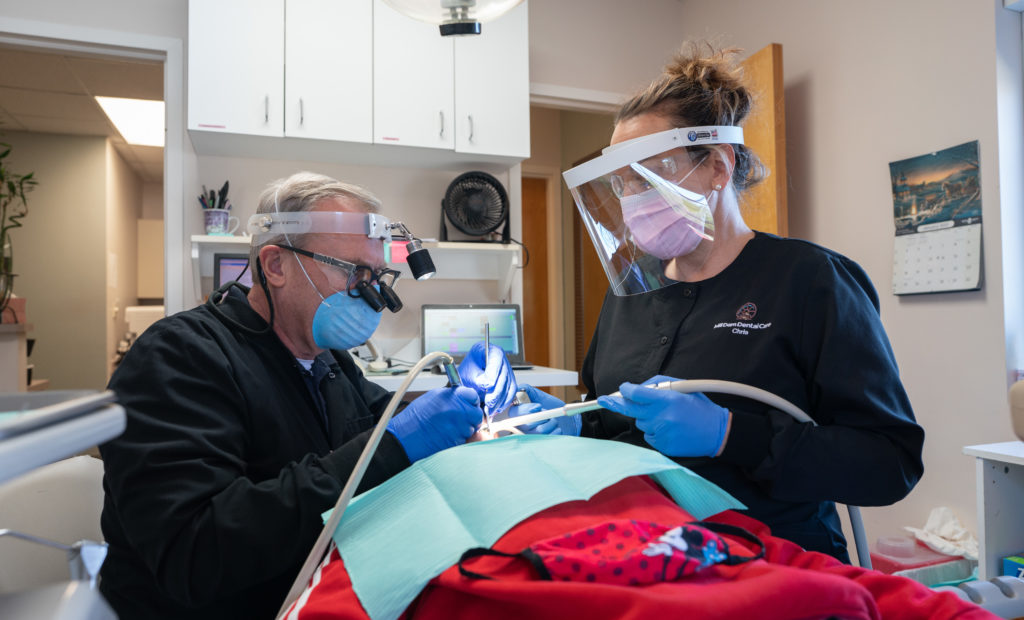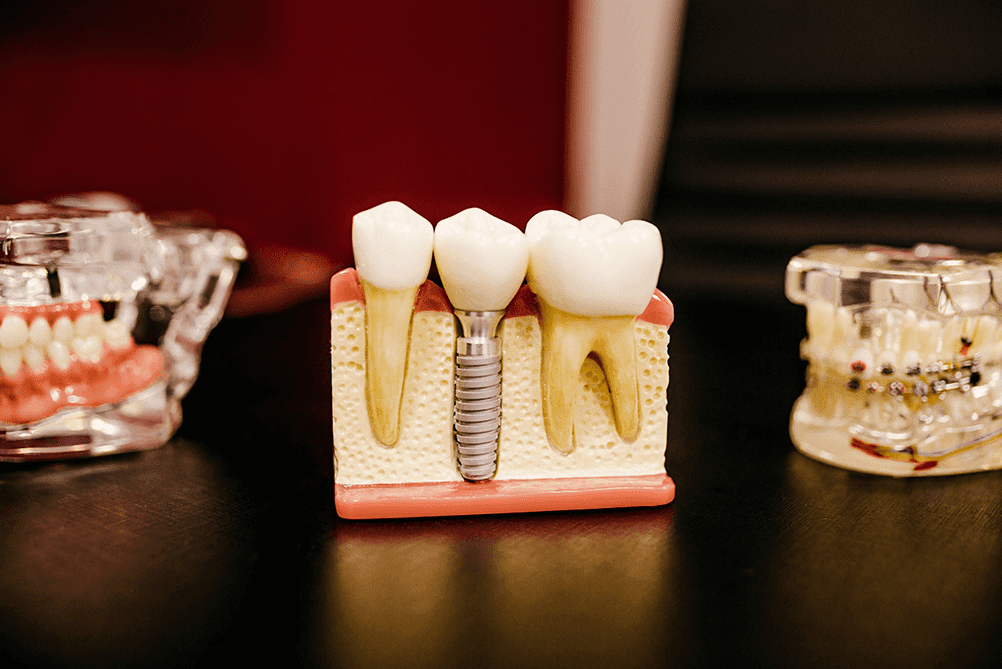A full mouth dental implant treatment is often the best solution for those who have lost more than half of their teeth. This is one of the most intense dental procedures we can do, but will help those who have lost their teeth regain the full function and appearance of their mouth.
Mill Dam Dental is a leading provider of dental implants in Virginia Beach. In this article, we’ll answer all your questions about full mouth dental implant treatments – what to expect, whether it’s right for you, and more.
What is a full mouth dental implant treatment?
This type of treatment can replace teeth on either your upper or lower jaw, or both. This procedure can be quite time consuming, as your dentist will need to place several implants on each jaw and then attach a set of porcelain teeth to these implants with either screws or cement. Your dentist will customize your implants depending on the shape of your mouth and your preferences when it comes to your smile.
Who should get a full mouth dental implant treatment?
Since this is an intensive and time consuming procedure, it’s not going to be right for everyone. In general, this treatment is best for those who have lost at least half their teeth. For those who have lost at least half their teeth, full mouth dental implants are much more efficient than replacing each tooth individually. Full mouth dental implants could also be the right solution for someone who has advanced stage periodontal disease and is at a high risk for losing more than half their teeth in the future.
There are some people who will not be eligible for full mouth dental implants. There are certain health conditions that could cause complications during this type of treatment, and so we recommend exploring other options for your safety. These include diabetes, auto-immune conditions, heart disease, and more. Those who are currently undergoing chemotherapy or are currently pregnant will also be considered higher risk and may not be eligible for a full mouth dental implant treatment.
Additionally, those who smoke will need to quit smoking several weeks prior to the procedure. They will need to wait for their implants to fully heal before it is safe to resume smoking. This is because smoking weakens the immune system and can make it harder for your jaw to fuse with the implants.
There are several alternatives to a full mouth dental implant treatment. If you’ve only lost one tooth, an individual implant is going to be an easier and more economical solution. A removable flipper could also be an option for those who want to avoid an intensive procedure, but this is typically only recommended as a temporary solution.
For those who have lost more than one tooth but haven’t lost enough teeth to qualify for full mouth implants, bridges are a great solution. Bridges are sets of multiple replacement teeth in a row that are supported either by implants or your existing teeth. If you’ve lost more than half your teeth but don’t want to get full mouth implants, dentures can serve as a viable solution.
However, dentures come with some disadvantages. Dentures wear out over time, which means that they’ll eventually need to be replaced. They also limit what you can eat, and they can also be uncomfortable at times.

What To Expect From Full Mouth Dental Implant Treatments
Before you can get a set of full mouth dental implant treatments, you’ll need to have a consultation with dentist to see if you qualify. During the consultation, your dentist will assess your teeth and jaw to get a better idea of exactly which teeth will need to be replaced and what sort of structural support you’ll need. They will also walk you through the process and give you more specifics about sedation, recovery time, and other key details about the procedure.
Scans and Development
Once you’ve decided to go forward with your full mouth dental implants, your dentist will need to conduct some scans. These may include x-rays and CAT scans to better assess the current state of your teeth and jaw. Your dentist will then use these scans to create a virtual mock-up of your implants. Modern technology makes it easy for your dentist to develop a very precise implant design before the procedure. You’ll also be involved in the process of designing the final look of your smile. You’ll have the opportunity to provide input on the shape and placement of your porcelain replacement teeth. The end goal is to create a smile that looks natural.
Implant Placement
During the actual procedure, your dentist will need to place anywhere between 10 to 14 implants in your jaw. This process replaces the roots of the teeth with a durable titanium implant that is designed to fuse with your jaw over time. This is very important because it actually helps to prevent bone loss from the jaw later on. Your dentist may need to remove existing teeth that are damaged to a point where they cannot heal anymore.
During the actual procedure, your dentist will need to place anywhere between 10 to 14 implants in your jaw. This process replaces the roots of the teeth with a durable titanium implant that is designed to fuse with your jaw over time. This is very important because it actually helps to prevent bone loss from the jaw later on. Your dentist may need to remove existing teeth that are damaged to a point where they cannot heal anymore.
Osseointegration
After your dentist places the implants, they will attach a set of temporary bridges. These bridges will remain in place until your implants have fully fused with your jawbone in a process called osseointegration. Osseointegration happens naturally, but can take several months. You’ll have follow-up appointments with your dentist during this period to make sure that the implants are fusing successfully with your bone.
Once osseointegration is complete, your dentist will attach your new permanent teeth. These are typically made of porcelain and are very durable. They will feel and function very similarly to natural teeth. These teeth will be fixed in place using an abutment.
Recovery From Implant Placement
It’s very important to take it easy in the days and weeks following your implant placement. You will likely notice swelling and bruising around your mouth as the implants heal. In some cases you might also experience small amounts of bleeding, but this should clear up quickly. Mouth pain is very common with implants, and your dentist will prescribe you the appropriate medication to help with this.
You’ll need to stick to liquids and soft foods during this time. Even after the swelling starts to subside, you shouldn’t chew on ice or other hard items. You should also completely avoid smoking, as this could damage your implants and make it very difficult for them to heal. You’ll need to be very diligent with your dental hygiene, making sure to brush and floss according to your dentist’s instructions.

How much do full mouth dental implants cost?
The price of a full mouth dental treatment will vary depending on a variety of factors. In some cases, your medical or dental insurance will cover part of the treatment, which could dramatically reduce the cost. If you don’t have access to dental insurance, your dentist may be able to help you find financing options to make the treatment more affordable.
In general, a full mouth dental implant treatment can run anywhere from $30,000 to $70,000. The overall cost will depend on how many implants and porcelain teeth replacements you need. It’s important to note that the cost of getting a full mouth dental treatment is still cheaper than getting each implant done individually.
The prices of dental services can also vary depending on where you live and how experienced your dentist is. They can also depend on the current state of your jaw. For example, in some cases dental implants will require a bone graft, which makes the treatment more expensive. Be sure to talk with your dentist about costs in your initial consultation. Cost should not prohibit you from getting the dental treatment that you need, and your dentist will likely be able to help you find a financing solution that works well for you.
For people who have lost several teeth, full mouth dental implants are a solution that can help you live a healthier and more comfortable life. These implants are extremely durable and are designed to function the way your natural teeth would. If you’re interested in learning more about a full mouth dental implant treatment, contact the experts at Mill Dam Dental Care today.

